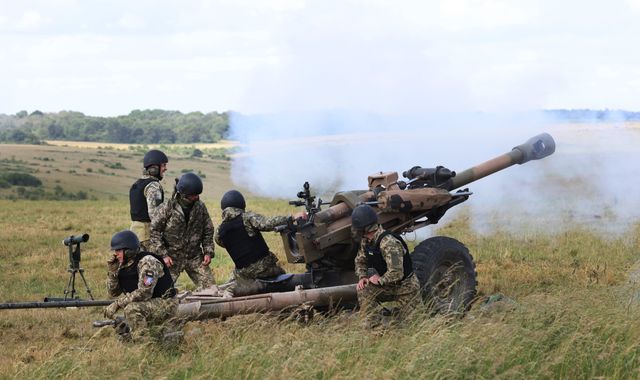Iran attack and Ukraine war expose growing weakness by West to deter threats
15 April 2024, 12:19 | Updated: 15 April 2024, 15:10

Iran's unprecedented attack on Israel and Russia's full-scale war in Ukraine - in defiance of calls for restraint - appear to expose a growing weakness by Western allies to deter threats.
Unless addressed, this could see the unravelling of a global order that has favoured liberal democracies over authoritarian regimes since the end of the Second World War.
It is why a growing number of serving and former military commanders, ministers and civil servants as well as analysts and academics across the NATO alliance are sounding the alarm about the need for Western allies to rearm fast in the face of escalating world tensions.
Middle East latest: Failed attack was 'double defeat' for Iran, Cameron says
That means a rapid reinvestment - spent far better - on Western militaries and a renewed focus on the kind of civil defence and deterrence that existed during the Cold War, including greater capacity to build weapons and improving the resilience of individual citizens.
Without such a shift in mindset, NATO allies risk being outgunned, outmatched and outdone by adversaries such as Russia, Iran, China and North Korea, who have been busy growing their military strength over the past three decades as European nations in particular hollowed out theirs following the collapse of the Soviet Union.
Evidence of increasingly emboldened authoritarian states was on display over the weekend.
Iran chose to launch an unprecedented barrage of more than 300 drones and missiles, including ballistic missiles, against Israel in retaliation for what it said was an Israeli attack against an Iranian consular building in the Syrian capital of Damascus.
The massive Iranian strike was initiated in the face of public and private calls by the US, the UK and other allies not to hit Israel back directly.
A Western security source said Tehran's willingness to approve such a significant onslaught was an indication that the regime had been emboldened by Western weakness over Russia's war in Ukraine, where Russian forces have slowly been gaining ground.
"This is exactly the reason why," the source said. "Iran, Russia and China sense the weakness of the West, which is now split between two wars."
The source was referring to Ukraine as well as Israel's war against Hamas in Gaza.
Analysis:
Will Israel let an attack by Iran go unpunished? Probably not
All-out war, or not, in the Middle East?
Israel and coalition allies gave impressive display of force
The Israeli military, with a coalition of allies, including the United States and the UK but also a number of Arab states, managed to destroy the vast majority of the incoming Iranian airstrikes in an impressive display of force.
But this kind of shield would have used up huge amounts of expensive air-defence ammunition and could not be guaranteed to be as successful every time if Iran launched more waves on a similar scale in response to any future retaliatory strike by Israel.
It is a limiting factor that will surely feature in Israeli calculations about what to do next.
Finite weapons stockpiles also a factor in Ukraine
The finite nature of weapons stockpiles and production capacity is a huge factor in Ukraine as well.
Russia, after ignoring Western calls to switch off its invading forces, initially suffered humiliation when it attacked Ukraine in February 2022.
Backed by Western weapons, Ukrainian forces repelled Russian troops from an attempt to storm the capital, Kyiv, and pushed them out of the north of the country, while also challenging them in the south and the east.
Fast forward two years, however, and President Vladimir Putin has long since put his economy on a war footing, and galvanised the production of military equipment and ammunition, while sourcing large volumes of munitions from allies such as Iran and North Korea.
Listen above then tap here to follow the Sky News Daily wherever you get your podcasts
Western nations talked tough but acted very slowly
By contrast, a majority of Western nations have talked tough but acted very slowly to revive their respective defence industrial base.
This has left Ukraine with an increasingly dangerous hole in ammunition and weapons that Russia is exploiting in a move that will become increasingly perilous unless the shortfall is fixed fast.
There is a lot at stake.
A failure by NATO allies to enable Ukraine to withstand the Russian assault would not only be devastating for Ukraine, it would also offer fresh proof to other authoritarian powers, such as Beijing and Pyongyang, about the effectiveness of hard military power.
This could in turn pose a threat to the way of life for everyone in every free, liberal democracy in the world.
(c) Sky News 2024: Iran attack and Ukraine war expose growing weakness by West to deter threats

























